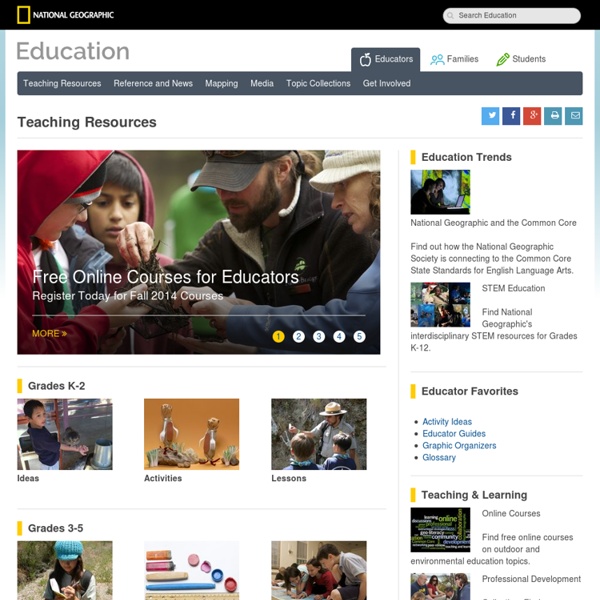physicscentral
Teachers Homepage - National Geographic Education
This website would like to remind you: Your browser (Firefox 17) is out of date. Update your browser for more security, comfort and the best experience on this site. Educators! Take our survey for a chance to win a $50 Amazon gift card. Xpeditions is now archived in National Geographic Education's new website—natgeoed.org If you liked Xpeditions, you'll love the new media-rich natgeoed.org. www.natgeoed.org Please note: to search for Xpeditions content, check the “include archive” filter. National Geographic Education Twitter Facebook Google+ Email Quiz Connection! Most Popular Latest Videos Giant Traveling Maps Get great resources for introducing geography and map-reading skills to students in Grades K-8.
CK-12 People's Physics Concepts
1. Units and Problem Solving Units identify what a specific number refers to. 2. One dimensional motion describes objects moving in straight lines. 3. This chapter discusses parabolic and projectile motion, acceleration, and velocity. 4. In this chapter, we explore forces and Newton's laws. 5. Forces which cause objects to turn around continuously in a circle are known as centripetal forces. 6. Isaac Newton in a triumph of brilliance declared that there is one law of physics that governs motion and he unified “earthly” bodies and “heavenly” bodies with the The Universal Law of Gravitation. 7. The total amount of motion in the universe is constant. 8. When any two bodies in the universe interact, they can exchange energy, momentum, or both. 9. The third conservation law is conservation of angular momentum. 10. The development of devices to measure time, like the pendulum, led to the analysis of periodic motion. 11. 12. 13. 14. 15. 16. 17. 18. 19. 20.
A Science Teacher Shares Tech Resources For Teachers, Parents & Students
I teach Middle School Science, mainly physical, environmental, and life to 6th and 8th graders. Through grants I have acquired 14 iPads for my students to use everyday. Students are also welcome to use their own handheld devices or smartphones. Stopwatch + Calculator When we do labs, students make use of the iPad app iLab: Timer HD (not free) as a stopwatch as well as the free calculator app Pcalc Lite. A handy biology app A nice paid app for Biology is the Cell and Cell Structure app, which I was able to try out for free – my students did use it and like it. Dissection apps If your students do any animal dissection you can offer kids an alternate way to dissect virtually with Frog Dissection and Rat Dissection, both excellent apps that my students, even 6th graders who don’t do any dissecting, love to use. Office app for iPad One iPad app that we get a lot of use from is Office2 HD. Some students really enjoy creating their own animations and Doink is a great app for that.
Language Arts
Stellarium
Social Studies
Skip navigation Skip to main content SAFE | State Agencies | Online Services Follow Home > Academic Content Standards > Social Studies Social Studies Contact Information Dwight Groce Social Studies Consultant (P) 614-387-3200 dwight.groce@education.ohio.gov Linda McKean Social Studies Consultant (P) 614-387-0957 linda.mckean@education.ohio.gov The State Board of Education has adopted the Ohio Revised Standards in Social Studies as part of Ohio's New Learning Standards for academic learning. Content Standards Model Curricula In October 2013, Career Connections strategies were added to the Instructional Strategies in the model curricula. Ideas and Problems Related Last Modified: 2/25/2014 3:42:22 PM Pursuant to ORC 3301.079 (B) (3) and 3313.60, it is the responsibility of Ohio's local boards of education to vet and approve curriculum and educational materials for use in the public schools within their district. More Sharing Services3
BioEd Online: Biology Teacher Resources, Lesson Plans
is pleased to offer a new online series of podcasts and supplementary standards-based educational activities, research information, and links. National Space Biomedical Research Institute (NSBRI) researcher, Dr. Babs Soller of the University of Massachusetts Medical School, has been working to develop techniques for non-invasive measurement of blood and tissue chemistry. Her work can be used to help monitor the health of astronauts in space. National Space Biomedical Research Institute (NSBRI) scientist Scott Dulchavsky has developed a technique to train space flight crews to conduct medical-quality ultrasound imaging in space. David Dinges, a professor at the University of Pennsylvania School of Medicine, is working with the National Space Biomedical Research Institute (NSBRI) to develop a test that helps astronauts to gauge fatigue and stress during long missions in space.
Science360 - The Knowledge Network
Lawrence Hall of Science - 24/7 Science
How fast does the wind blow? What makes things sticky? Where do insects live and plants grow? So many questions—and so many ways to find answers! Bridge Builders How Fast Is the Wind Gooo! Filling Without Spilling Parachute Drop Crystals Bird Beaks Sticky Situations Oil Spill How Old is Your Penny? Measure Yourself Where Do Plants Grow? Bug Hunt! Afterschool KidzScience AfterSchool KidzScience™ kits are designed specifically for children in grades 3 - 5 in out-of-school settings. Check Out Science Check Out Science makes doing science with your family easy, no scientific expertise necessary. Explore Your World You don't have to trek through a rainforest, blast off for space, or dive to the deep sea to explore your world. Roadside Heritage Roadside Heritage is an informal science educational project with its origins in the stunning landscape of the Eastern Sierra along the 395 scenic byway. Save Sam! Green Milk Save Ratty Virus Worker Nano Puzzle How Small is Small What is an SEM? Mr.
Helping Children Around the World to Read and Learn
NSDL.org - National Science Digital Library



